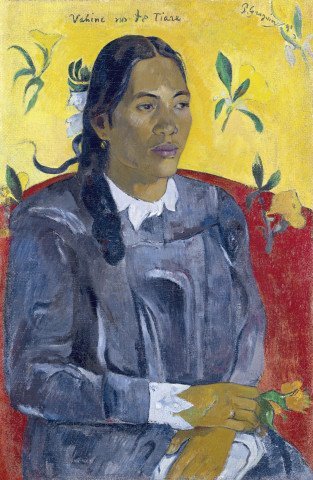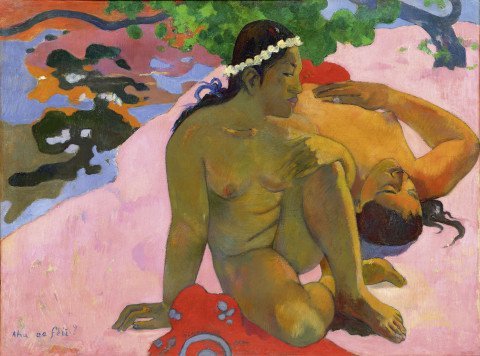Gauguin’ show at Fondation Beyeler: “Beware of luxury!” Paul said
- Paul Gauguin, Vahine no te tiare, 1891 La Femme à la fleur (Woman with a Flower), oil on canvas, 70.5 x 46.5 cm., Ny Carlsberg Glyptotek, Copenhagen Photograph by Ole Haupt.
- Paul Gauguin, Aha oe feii?, 1892 (Eh quoi! tu es jalouse? – What! Are You Jealous?), oil on canvas, 66 x 89 cm., the Pushkin State Museum of Fine Arts, Moscow. Photograph © The Pushkin State Museum of Fine Arts, Moscow.
- Paul Gaugui, Pot en forme de tête, Autoportrait, 1889, (Jug in Form of a Head, Self-Portrait), stoneware, height 19.5 cm, Designmuseum Danmark, Copenhagen, photograph by Pernille Klemp.
- Paul Gauguin, Nafea faaipoipo, 1892, (Quand te maries-tu? When Will You Marry?), oil on canvas, 105 x 77.5 cm., Rudolf Staechelin Collection, photograph by Kunstmuseum Basel, Martin P. Bühler.
- Paul Gauguin Autoportrait à la palette, ca. 1893/94 (Self-Portrait with Palette), oil on canvas, 92 x 73 cm, private collection.
- Paul Gauguin, Contes Barbares, 1902 (Primitive Tales), oil on canvas, 131.5 x 90.5 cm, Museum Folkwang, Essen Photograph © Museum Folkwang, Essen.
- Installation view of the exhibition « Paul Gauguin », Fondation Beyeler, Riehen/Basel, 2015, with the works: Oviri (Sauvage), 1894; Arearea (Joyeusetés (I)), 1892; Matamua (Autrefois), 1892; Nave nave moe (Délicieux mystère; Douces rêveries), 1894; D’où venons-nous? Que sommes-nous? Où allons-nous?, 1897/98.
- Installation view of the exhibition « Paul Gauguin », Fondation Beyeler, Riehen/Basel, 2015, with the works: Aita tamari vahine Judith te parari (La femme-enfant Judith n’est pas encore dépucelée), 1893/94; Portrait de jeune fille (Vaïte Goupil), 1896; Madeleine Bernard, recto: La Rivière blanche, 1888; Faaturuma (Boudeuse), 1891.
To the Fondation Beyeler’s curatorial staff it took six years of hard work and sophisticated diplomacy to realize what will be considered a milestone in Paul Gauguin’s post mortem career. When dealing with such a master, obtaining loans from art institutions like the Musée d’Orsay, the Tate, the MoMA or the Hermitage, is not only a problem of money and prestige. Effectively, even for art institutions of this kind, is always embarrassing towards their visitors to justify the absence of a rare masterpiece. And it is even more embarrassing for them to realize that some of their visitors are probably asking themselves why the most important exhibition dedicated to Gauguin is actually taking place in a small city like Basel (less the 170,000 citizens) and not where they are? Does it mean that they are visiting the wrong place?
Even if under the pressure of the international economic community Switzerland is progressively losing one of its main asset, the bank secrecy, the efficiency of Basel with regards to culture – and the consequent quality of its art institutions – proves that great achievements in art are indeed possible even out of big cities and titanic museums. Lightness, sometimes, could be the trump card, and after all the fact that this exhibition has been the most expensive one organized by the Fondation Beyeler up to now – CHF 5 millions, including insurance and transports, with Novartis as the main sponsor – doesn’t make this success less remarkable.
On the contrary, this detail possibly increases the importance of the message that Gauguin’s extreme life experience conveys to the Fondation’s audience, a message that this passage from Noa Noa chosen by Keanue Reeves for his public reading of Gauguin’s book at the Fondation perfectly represents:
Or is it–who knows–the very deepest of philosophy? Beware of luxury! Beware of acquiring the taste and need for it, under the pretext of providing for the morrow…
Life each day became better.
I understand the Maori tongue well enough by now, and it will not be long before I speak it without difficulty.
My neighbors–three of them quite close by, and many more at varying distances from each other–look upon me as one of them.
Under the continual contact with the pebbles my feet have become hardened and used to the ground. My body, almost constantly nude, no longer suffers from the sun.
Civilization is falling from me little by little.
I am beginning to think simply, to feel only very little hatred for my neighbor–rather, to love him.
All the joys–animal and human–of a free life are mine. I have escaped everything that is artificial, conventional, customary. I am entering into the truth, into nature. Having the certitude of a succession of days like this present one, equally free and beautiful, peace descends on me. I develop normally and no longer occupy myself with useless vanities.
I have won a friend.
He came to me of his own accord, and I feel sure here that in his coming to me there was no element of self-interest.
He is one of my neighbors, a very simple and handsome young fellow.
My colored pictures and carvings in wood aroused his curiosity; my replies to his questions have instructed him. Not a day passes that he does not come to watch me paint or carve…
Even after this long time I still take pleasure in remembering the true and real emotions in this true and real nature.
In the evening when I rested from my day’s work, we talked. In his character of a wild young savage he asked many questions about European matters, particularly about the things of love, and more than once his questions embarrassed me.
But his replies were even more naïve than his questions.
One day T put my tools in his hands and a piece of wood; I wanted him to try to carve. Nonplussed, he looked at me at first in silence, and then returned the wood and tools to me, saying with entire simplicity and sincerity, that I was not like the others, that I could do things which other men were incapable of doing, and that I was useful to others.
I indeed believe Totefa is the first human being in the world who used such words toward me. It was the language of a savage or of a child, for one must be either one of these – must one not?– to imagine that an artist might be a useful human being.
That is to say, this luxurious exhibition, in which the most expensive artwork ever sold is on show, is dedicated to an artist who lived in poor conditions – often extremely poor – and devoted his entire life to free himself from the constraints of the industrial society and city life. And funny enough, this exhibition is taking place in Basel, in a private foundation established by an extremely successful art dealer, Ernst Beyeler, while in Paris, where Paul Gauguin was born, the Centre Pompidou – a museum established in 1968 that should be the ultimate monument to the spiritual side of art and its democratic value – is dedicating a seminal retrospective exhibition to Jeff Koons, one of the very rare living artists who can actually afford a Gauguin.
February 21, 2019








